Concert - Prelude to Christmas
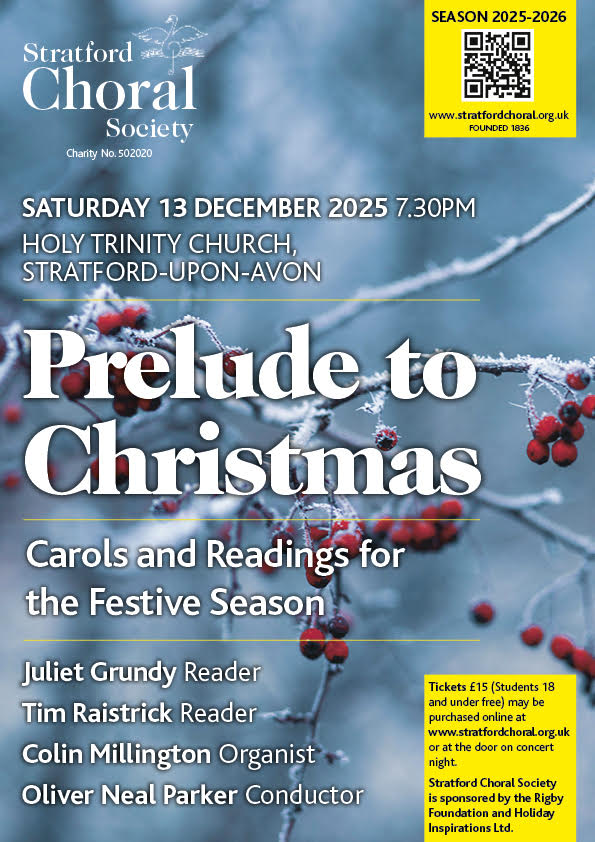 Our traditional Christmas concert returns this year. Join us on Saturday 13th December at Holy Trinity Church for an evening of Christmas music and seasonal readings. Our "Prelude to Christmas" has become an important part of seasonal festivities for many, heralding the real start of Christmas.
Our traditional Christmas concert returns this year. Join us on Saturday 13th December at Holy Trinity Church for an evening of Christmas music and seasonal readings. Our "Prelude to Christmas" has become an important part of seasonal festivities for many, heralding the real start of Christmas.We shall be singing Christmas music both old and new, and there will be carols for you to sing too. Seasonal readings will be given by two well known local thespians, Tim Raistrick and Juliet Grundy. Our conductor is Oliver Neal Parker and organ accompaniment is by Colin Millington who played so brilliantly in our November concert.
The following review was publihed in the Stratford Herald newspaper on 18th Decmber 2025
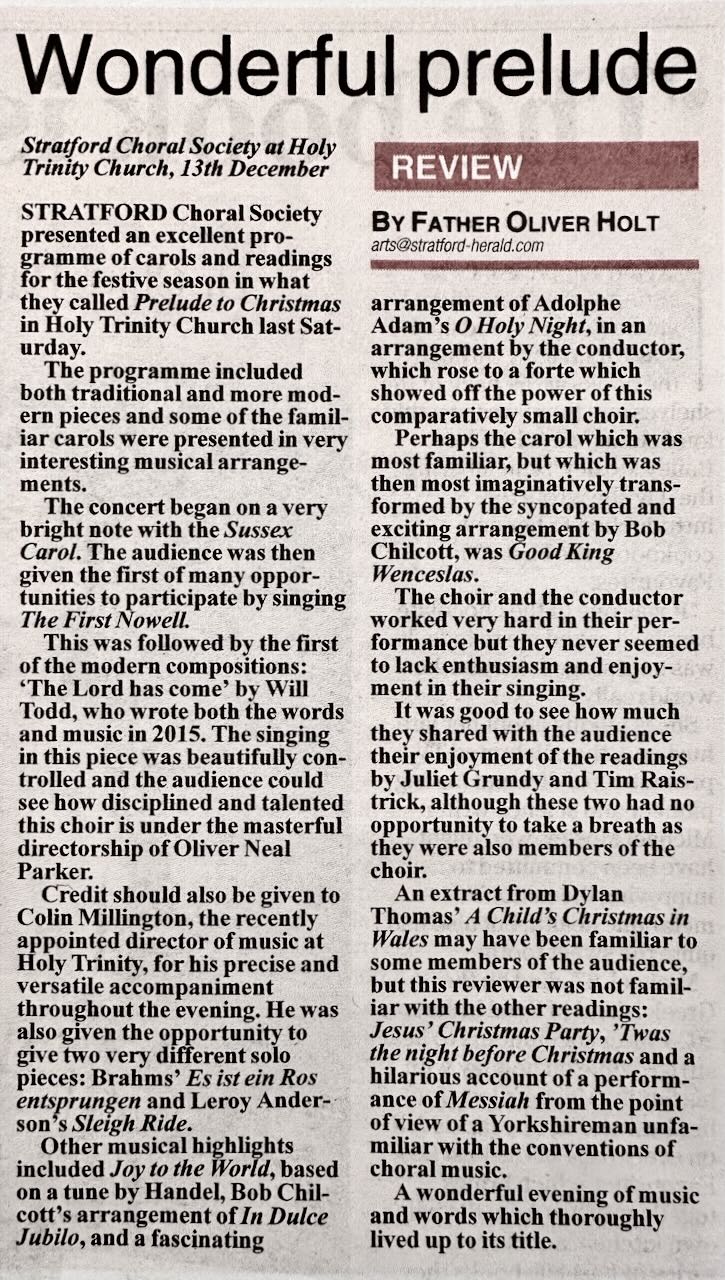
Concert - Fauré Requiem
Gabriel Fauré - Requiem
- Cantique de Jean Racine
Louis Vierne - Messe Solennelle
7:30pm on Saturday 15th November 2025
Holy Trinity Church, Stratford-upon-Avon
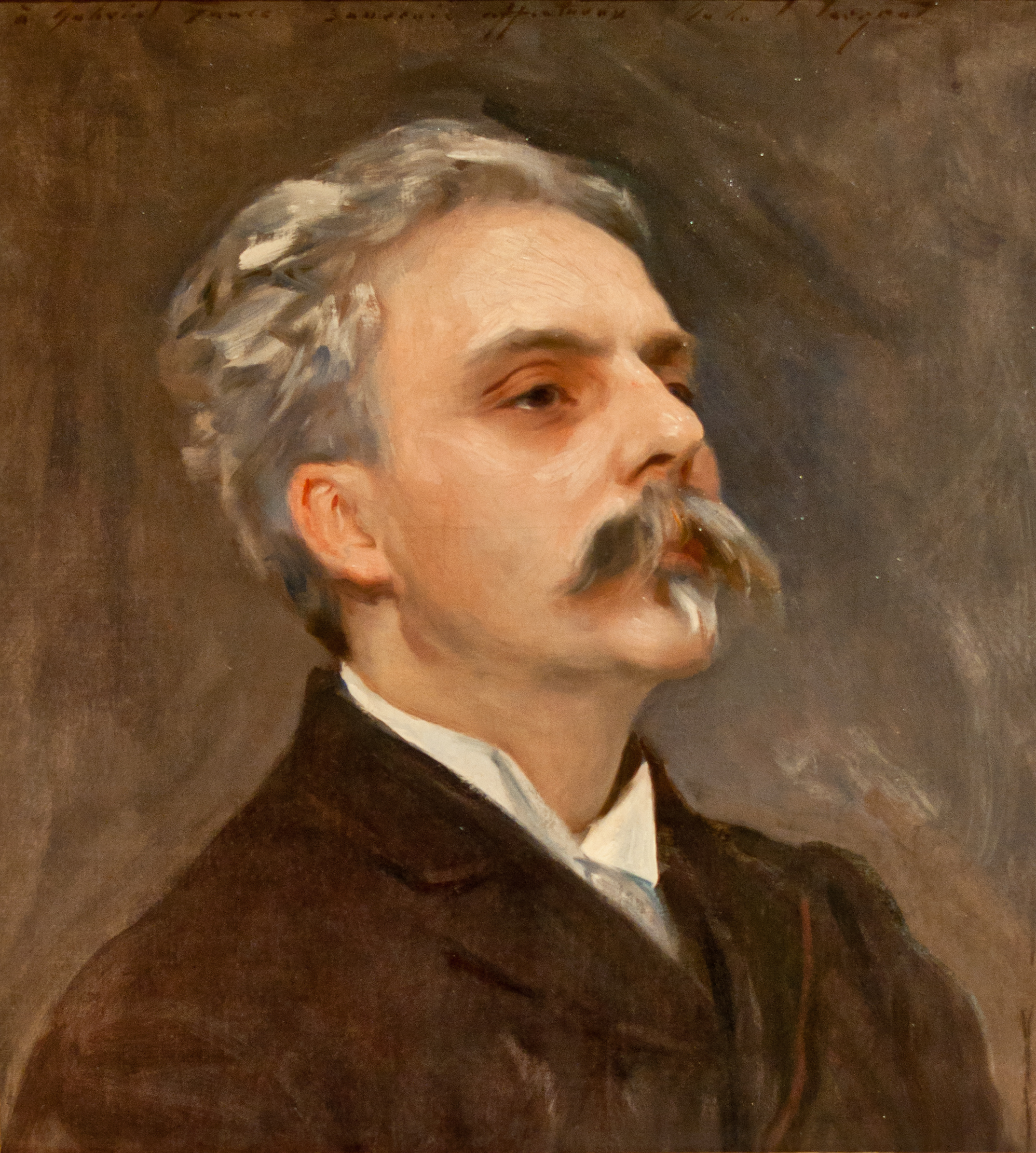 Gabriel Fauré's much loved Requiem is the main work in this concert. It is a work we love singing, so full of beautiful melodies, and was last performed by the Society in 2019.
Gabriel Fauré's much loved Requiem is the main work in this concert. It is a work we love singing, so full of beautiful melodies, and was last performed by the Society in 2019.
We will be performing his final version which was completed in 1890 after several revisions. Fauré himself clearly loved this work. "It has been said that my Requiem does not express the fear of death, and someone has called it a lullaby of death. But it is thus that I see death: as a happy deliverance, an aspiration towards happiness above, rather than as a painful experience." He asked for it to be performed at his own funeral in 1924, and it has remained his best known and most loved work.
We follow his Requiem with another well known work by Fauré, the Cantique de Jean Racine. Written when Fauré was 19 years old and still at music school, it was his entry to a composition competition.
He was fortunate to have Camille Saint-Saëns as one of his teachers and the two became lifelong friends and collaborators. Together they were at the centre of French musical life during a period when French classical music blossomed with composers including Ravel, Duruflé and Widor. Another less well known contemporary was Louis Vierne.
Vierne was a virtuoso organ player and composed works mainly for organ and church choir. His major choral work, the Messe Solennelle, completes our concert. Composed in 1899, it was initially scored for two organs and at the premiere Widor played one organ and the Vierne played the other. We cannot offer that level of stardom but we hope you will enjoy our performance!
Tickets are £20. Children 18 years or under admitted free. You can buy your tickets here on our website, or at the door if seats are still available.
Concert - Songs for a Summer's Evening
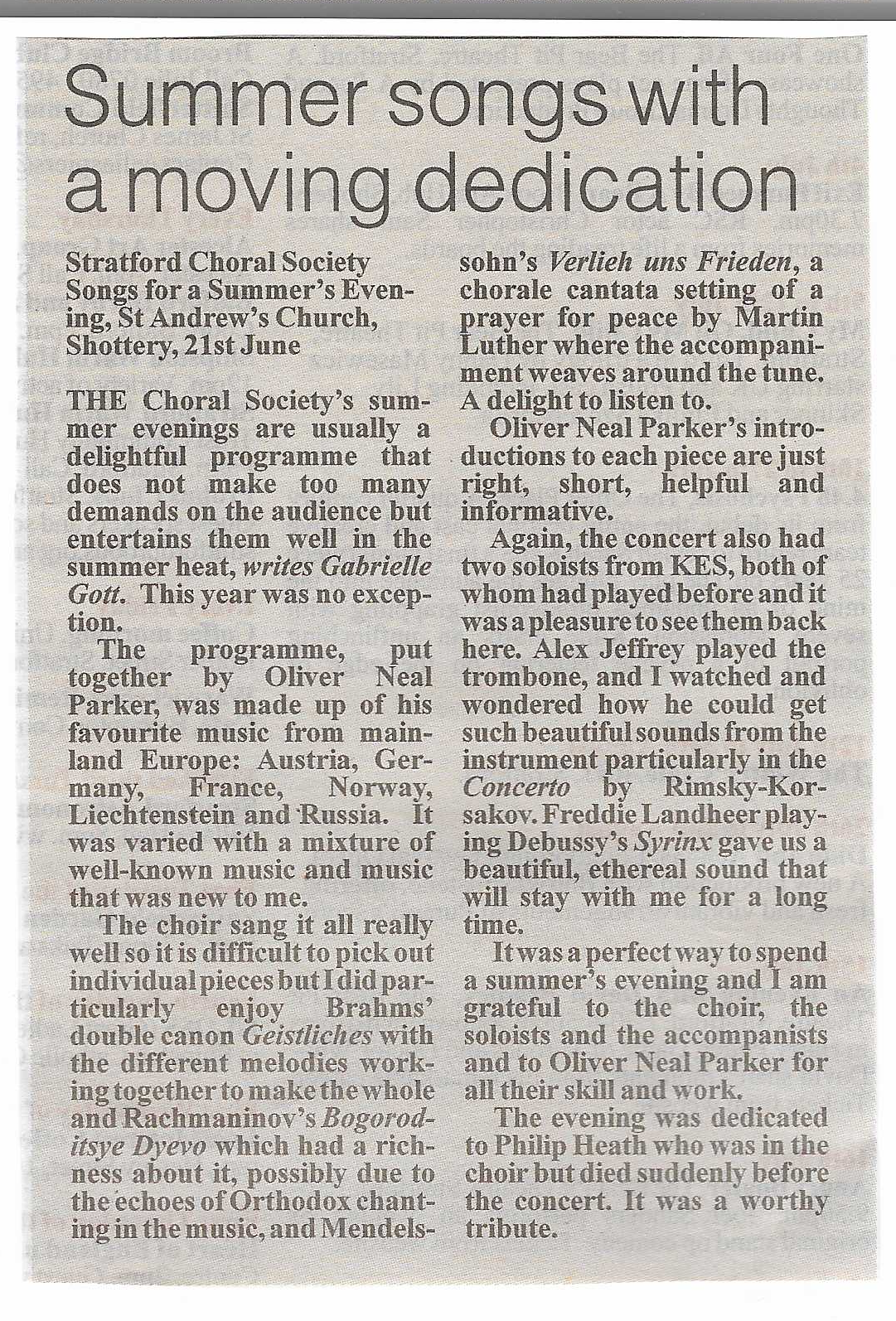
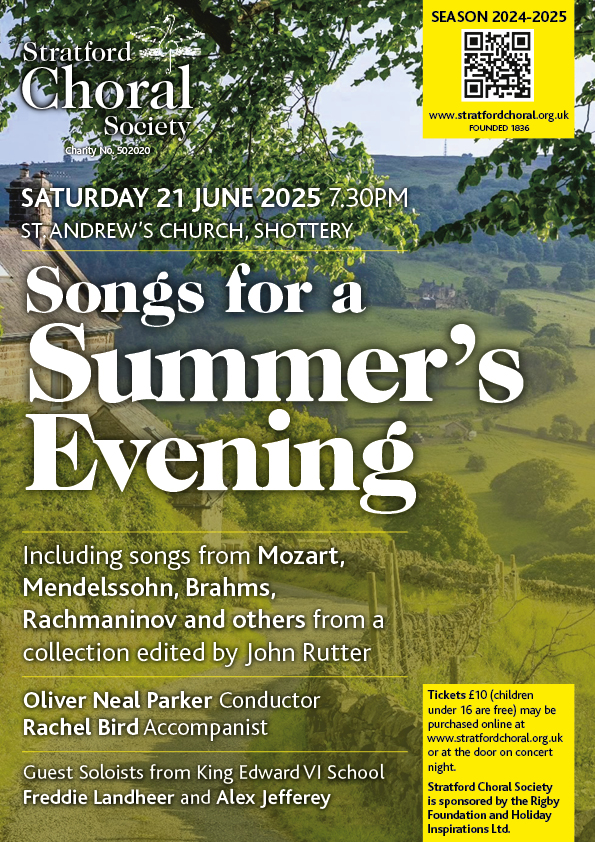
Concert - St John Passion
St John Passion by JS Bach
7:30pm on Saturday 29th March 2025
Holy Trinity Church, Stratford-upon-Avon
in January 2025 we performed J S Bach’s wonderful St John Passion.
About the St John Passion: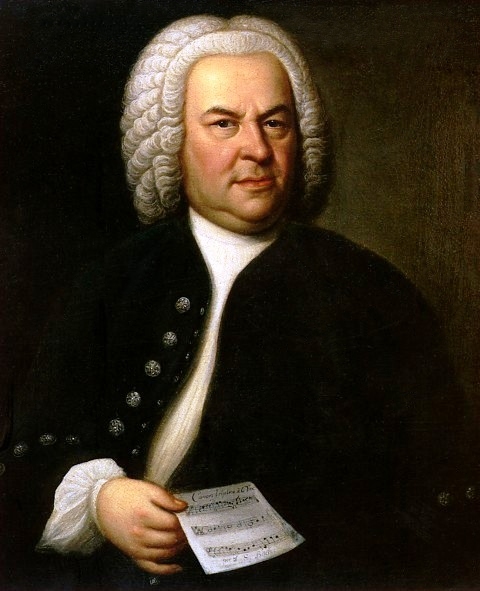
In the St John Passion, Bach sets to music the Passion of Christ as told in St John’s Gospel chapters 18 and 19. Telling of Jesus’ arrest, trial and crucifixion, this is a very dramatic piece. The biblical narrative is presented by the tenor solo (as the Evangelist), while various other roles (Jesus, Pilate, and the disciples) are taken by other soloists; and the chorus plays the part of the crowd.
Bach added verses from contemporary hymns. These would have been well known to his audience but were sung by the chorus and soloists. They serve to involve the audience further. He also added solo Arias using contemporary religious poetry as commentary.
The overall effect is at once religious, dramatic, and highly emotional. It is one of the masterpieces of Baroque music and it is a delight to be performing it again.
About this performance:
The St John Passion was premiered in 1725 and Bach performed it many times during his lifetime. He revised the score several times, and we sang his final version dating from 1749.

We sang the St John Passion in English, using a recent new translation by Neil Jenkins. We chose to sing in English because in the St John Passion, Bach tells a compelling story and it is really important that the audience can follow the narrative.
In a ‘first’ for Stratford Choral Society we were accompanied by an orchestra of period instruments, from Instruments of Truth and Time, based in Oxford.
And we had a stellar line-up of soloists: Nathan Vale (Tenor) as the Evangelist, Alexander Ashworth (Bass Baritone) as Christ, Miriam Allan (Soprano), Timothy Morgan (Alto), Simon Wall (Tenor), and Jimmy Holliday (Bass).
You can read a review of the concert here.
We are most grateful to Paul Badley who stepped in as Tenor soloist at the last moment as Simon Wall was unable to perform.
This performance was made possible by a generous legacy from the late Colin Nichols who sang for many years with the Stratford Choral Society.
Concert - Handel, Messiah
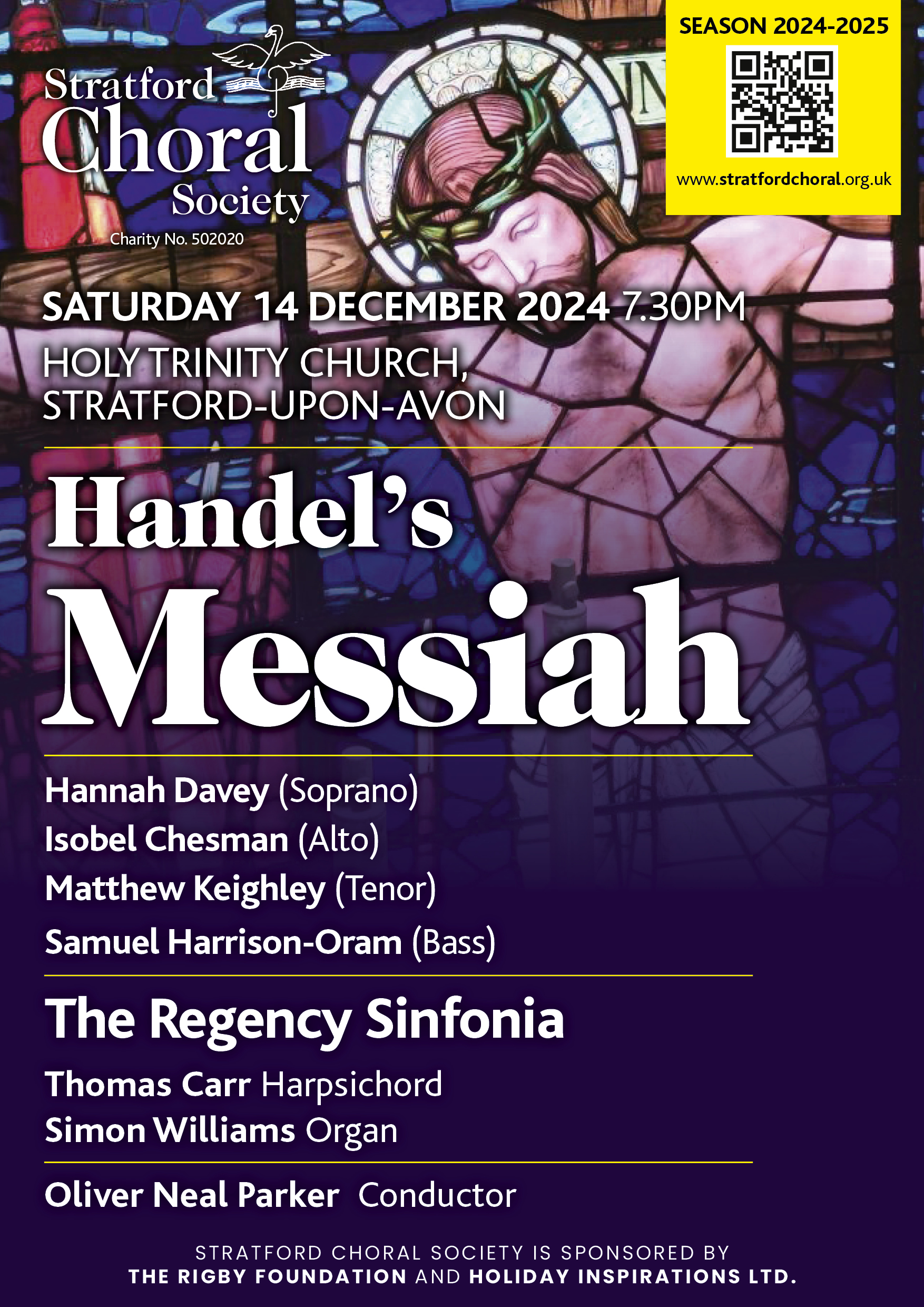
What a joy it was to sing The Messiah again this Christmas! We were thrilled to share this glorious experience with so many - a full house!
Composed by George Frideric Handel in 1741, The Messiah is one of the most celebrated choral works in Western music. Written in just over three weeks in a burst of inspiration, it tells the story of Christ’s birth, death and resurrection. Its text draws from the Bible to highlight themes of prophecy, redemption and salvation. While originally performed during Easter, The Messiah has become closely associated with Christmas, particularly for its famous “Hallelujah” chorus. Handel’s powerful use of chorus, soloists, and orchestra has made The Messiah a timeless masterpiece of emotional and spiritual expression.
Read the review of this concert on our News and Reviews page
Concert - Rossini's Petite Messe Solennelle
 Stratford-upon-Avon Choral Society’s 2024–2025 season opened on Saturday, 16 November with Rossini’s wonderful Petite Messe Solennelle.
Stratford-upon-Avon Choral Society’s 2024–2025 season opened on Saturday, 16 November with Rossini’s wonderful Petite Messe Solennelle.
Known best for his many operas, Rossini turned to religious work towards the end of his life and Petite Messe Solennelle was his last composition. It was written in 1863, first performed in 1864, and re-scored for orchestral accompaniment in 1867. The original version was scored for piano and harmonium accompaniment, and this is (almost) the version that we shall be presenting in our concert, as Rossini included two pianos, with the second piano ‘reinforcing’ the main piano at suitable places. The piece runs through a variety of musical styles and is a joy both to sing and to listen to, as well as being a challenge of stamina for the soloists, who join in singing with the choir in addition to their solo passages.
The professional soloists will be Rebecca Rudge (Soprano), Catherine Griffiths (Alto), Tim Burton (Tenor) and Samuel Harrison-Oram (Bass). Musical accompaniment is provided by Alex Aitken on piano and Simon Williams playing the harmonium. The concert will be conducted by the Society’s Musical Director, Oliver Neal Parker.
Summer concert
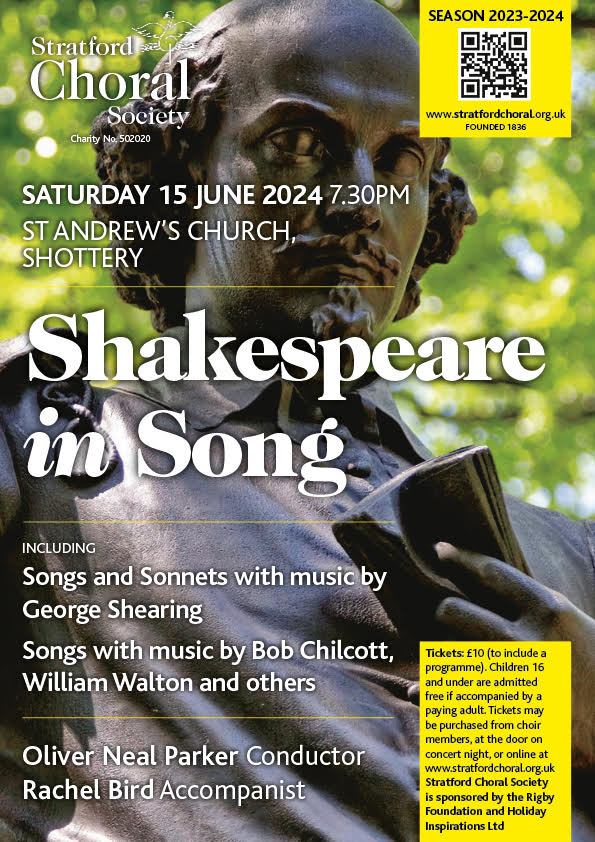
Shakespeare in Song
St Andrew's Church, Shottery
Saturday 15th June 2024 at 7:30pm
A review of this concert is now available on the News and Reviews page
Our summer concerts are an opportunity to sing something different, and this summer we have a more relaxed and less formal programme than our usual classical fare. We are singing songs by contemporary composers setting words by William Shakespeare.. The principal work will be a jazzy compilation of songs and sonnets by George Shearing.
The programme will include
- Songs and Sonnets from Shakespeare by George Shearing
- 'I know a bank where the wild thyme blows' by Sarah Quartel
- 'If music be the food of love' by Richard Allain
- 'The bird of dawning' by Bob Chilcott
- ‘Touch her soft lips and part’ by William Walton
Conductor: Oliver Neal Parker
Accompanist: Rachel Bird
Concert: Mozart's Requiem
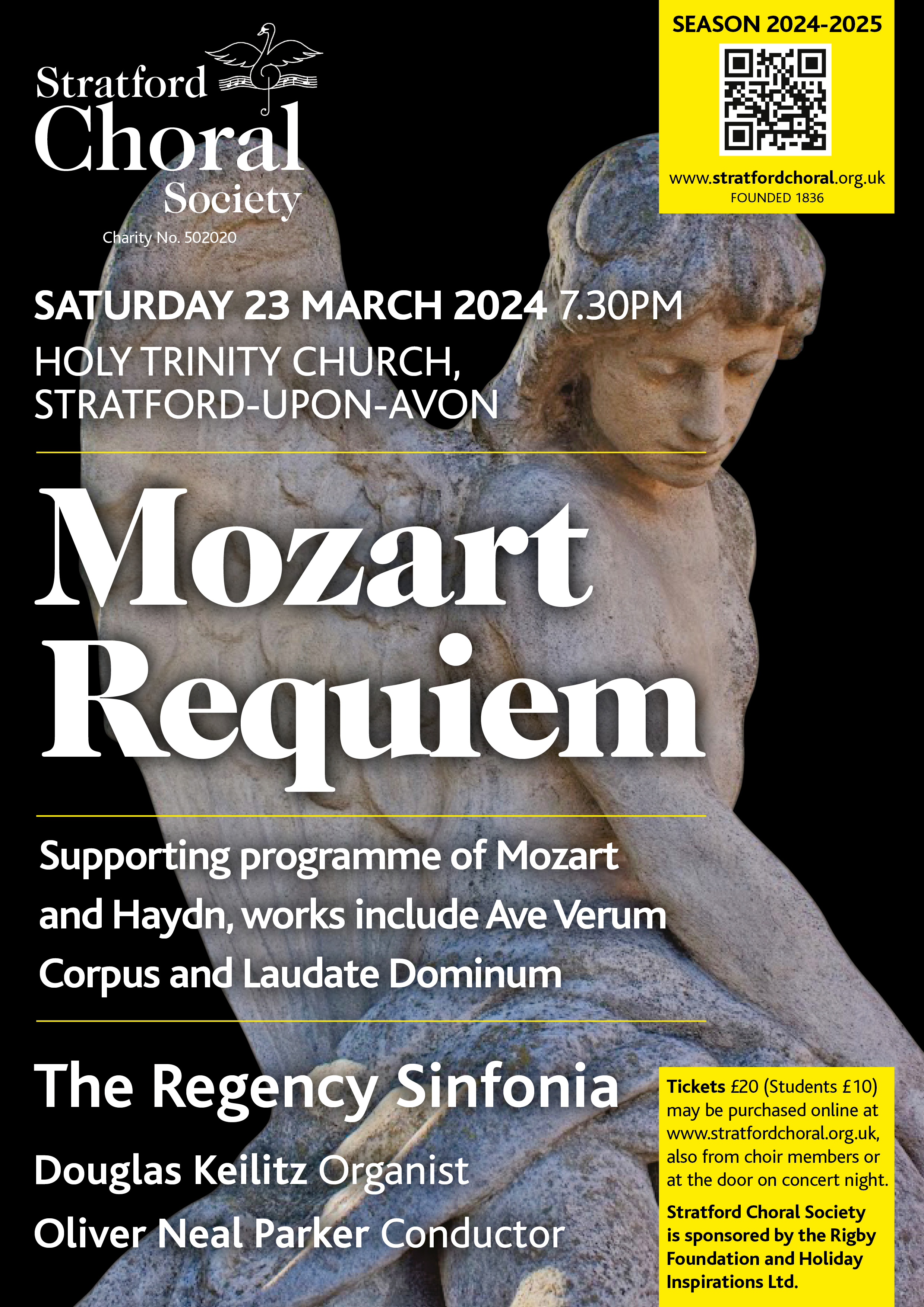 Our concert on March 23rd featured the wonderful Mozart Requiem. Written at the very end of Mozart's life, and left unfinished, we sang the version completed by Franz Süssmayr.
Our concert on March 23rd featured the wonderful Mozart Requiem. Written at the very end of Mozart's life, and left unfinished, we sang the version completed by Franz Süssmayr.
The evening started with Haydn's fiery motet Insane et Vanae Curae. Originally part of Haydn’s first oratorio, Il ritorno di Tobia (The Return of Tobias), Haydn extracted this fine choral piece, rewrote the liberetto in Latin, and revised it as a stand-alone work. This is the version we shall be performing in the concert.
Two short but well known Mozart choral works, the Ave Verum Corpus and Laudate Dominum, were topped and tailed by two fine orchestral pieces.
You can read a review of the concert here.
Concert: Prelude to Christmas
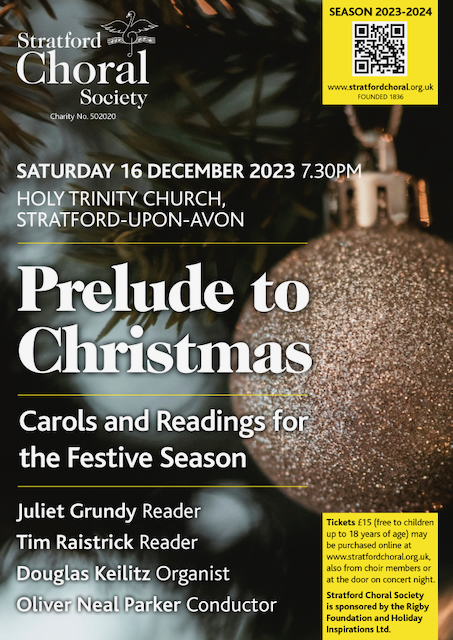
1 Old Town, Stratford-upon-Avon CV37 6BG
Saturday 16th December 2023 at 7:30 pm
Come and join us for our very special Christmas Concert on Saturday 16th December at Holy Trinity Church. Our "Prelude to Christmas" has become an important part of seasonal festivities for many, heralding the real start of Christmas.
We shall be singing Christmas music both old and new, and seasonal readings will be given by by two well-known local thespians, Tim Raistrick and Juliet Grundy. Our conductor is Oliver Neal Parker and organ accompaniment is by Douglas Keilitz.
Tickets for the concert (£15) are available from choir members or by clicking 'Buy tickets' below. Children up to 18 are admitted free if accompanied by a paying adult – a marvellous opportunity to introduce young people to choral music.
Samson by Handel
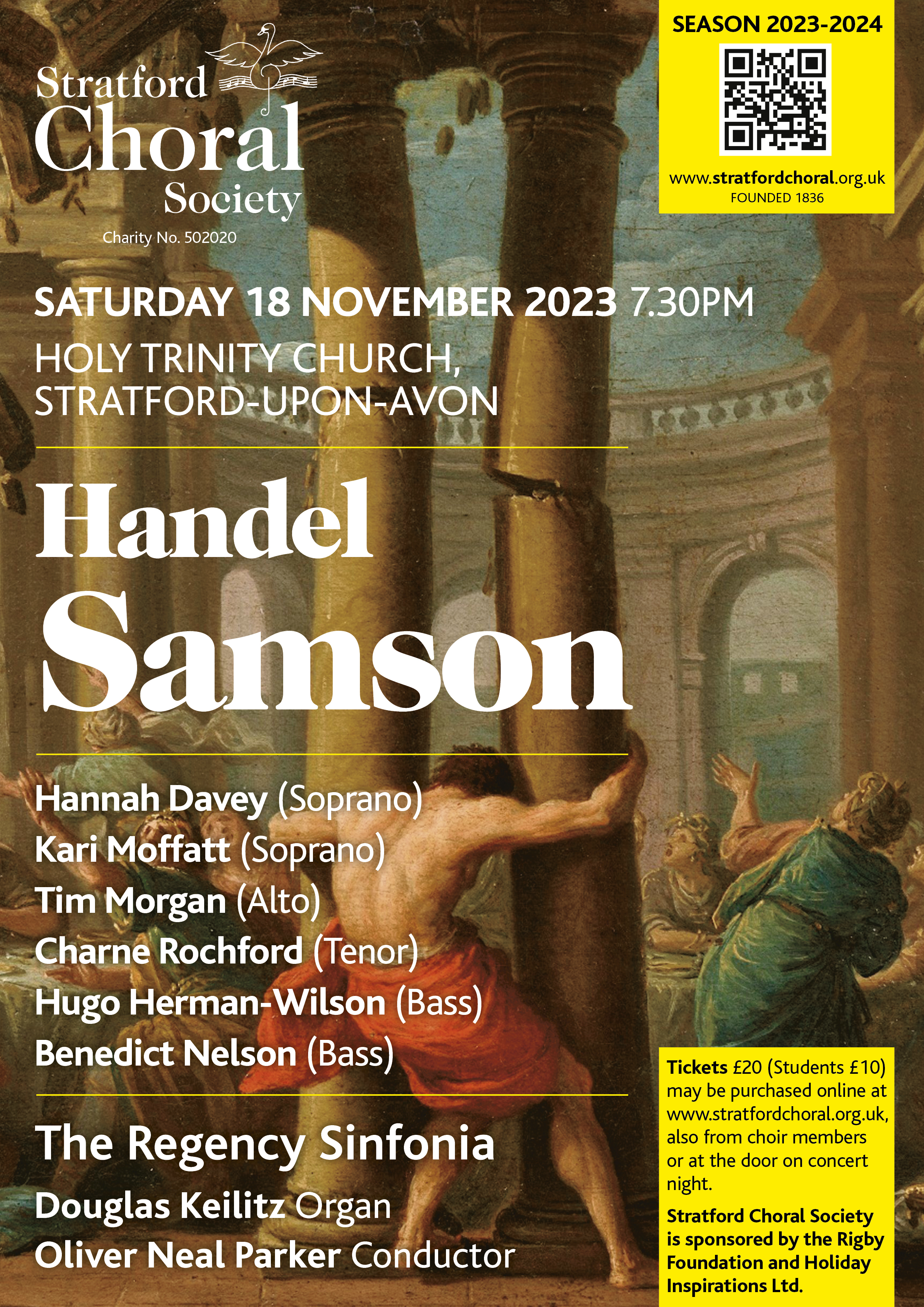
Saturday 18th November 2023 at 7:30 pm
Holy Trinity Church, Old Town, Stratford-upon-Avon CV37 6BG
Stratford Choral Society was excited to perform Samson for the first time in more than ten years. With a cast of six soloists and a large orchestra, it was a memorable musical occasion.
Two of our original soloists had to drop out at very short notice and we were very fortunate to get two excellent replacements - Tom Randle (Tenor) as Samson and Francis Gush (Countertenor) as Micah. Tom Randle is a well known opera singer and Handel specialist, and has recorded Samson with The Sixteen. Francis Gush is a new star in the opera world, recently getting high priase for his performance as Cesar in English Touring Opera's Giulio Cesare by Handel. Our sincere thanks to them both for stepping in at such short notice.
Samson is considered one of Handel’s finest dramatic works, telling the biblical tale of Samson and the destruction of the Philistine Temple of Dagon. Written shortly after Handel transitioned from writing operas to oratorios, it has characteristics of both. It is usually performed as an oratorio but on occasions has been staged as an opera.
The libretto by Newburgh Hamilton is based on Milton’s dramatic poem Samson Agonistes rather than the Biblical text. The chorus’s role is similar to a Greek chorus in that it sets the scene, offers moral comments, describes the action in thrilling detail and thus gives a backdrop to the various soloists whose characters are vividly portrayed through Handel’s dramatic writing.
Samson was written immediately after Handel finished writing the Messiah in 1741 and was first performed at Covent Garden Theatre in London in 1743. It was an immediate success with seven performances in its first season, the most in a single season of any of his oratorios. Samson retained its popularity throughout Handel's lifetime and has since then never fallen out of favour.
Our six soloists were
- Tom Randle (Tenor) as Samson
- Francis Gush (Countertenor) as Micah
- Hugo Herman-Wilson (Bass) as Manoah
- Eugene Dillon-Hooper (Bass) as Harapha
- Hannah Davey (Soprano) as Dalilah,
- Kari Moffatt (Soprano) as Dalilah’s handmaid.
Music for a Summer's Evening
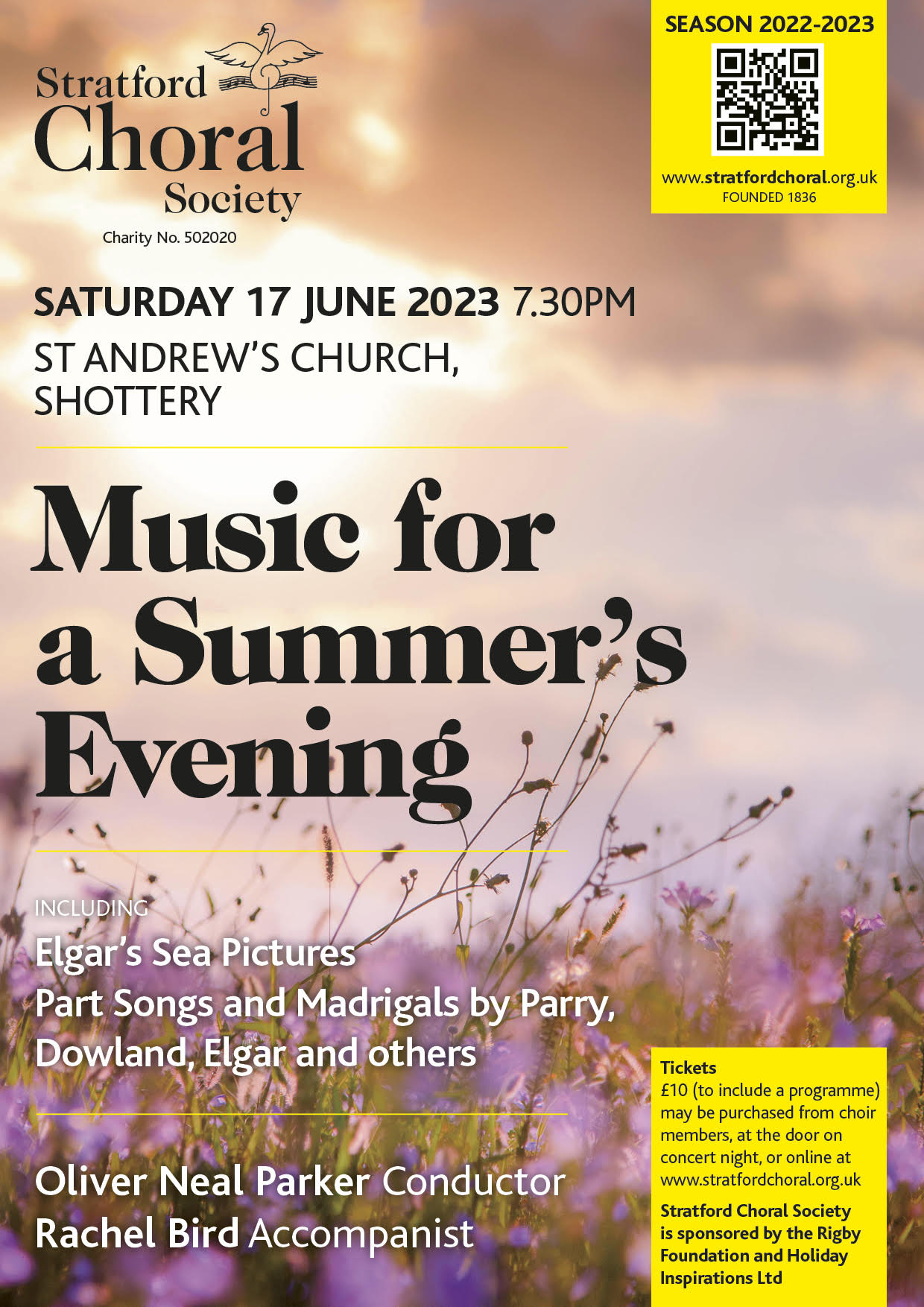
17th June 2023 at 7:30PM
St Andrew’s Church, Church Lane, Shottery, Stratford-upon-Avon CV37 9HQ
This year, Stratford Choral Society did something new. We extended our singing season beyond Easter, with an informal Summer concert in June.
What's on the programme?
With the sap rising and birds singing, summer is a time for madrigals and songs heralding the summer.
The centrepiece of our concert was a new four-part arrangement of Elgar’s Sea Pictures. Our Music Director writes:
“When I was at school I played the cello, and one of the first classical albums I bought was Jacqueline du Pré’s recording of Elgar’s Cello Concerto. On the ‘B’ side is Janet Baker’s sublime performance of Elgar’s Sea Pictures which, combined with the exquisite playing from the London Symphony Orchestra under Barbirolli, remains one of the great recordings of this masterpiece. The way the composer responds to the poetry and weaves together recurring themes is wonderfully satisfying.
"Donald Fraser’s arrangement allows all voice types to enjoy performing every note – not just low contraltos who also have a top A! The arrangement was commissioned by the Elgar Festival in Worcestershire, and has also been recorded by the English Symphony Orchestra and the Rodolphus Choir.”
This was complemented by a programme of traditional songs and madrigals, many of which celebrate romantic love.
-
Now is the Month of Maying (Thomas Morley)
-
Come Again, Sweer Love! (John Dowland)
-
The Silver Swan (Orlando Gibbons)
-
Fair Phylllis (John Farmer)
-
As Torrents in Summer (Edward Elgar)
-
The Blue Bird (Charles Villiers Stanford)
-
Linden Lea (Ralph Vaughan Williams)
-
Draw on, Sweet Night (John Wilbye)
Why not taste a madrigal by listening to the marvellous voice of Jon Rippe as he sings all four voices of Come Again, Sweet Love.
Rutter's Gloria and other English choral music
The programme featured John Rutter’s exciting Gloria, first performed in 1974. Written for choir, brass ensemble and either organ or full orchestra, it is a vibrant and compelling work. The composer described the character of the three movements as "exalted, devotional and jubilant" and the interplay between brass ensemble and choir is at times punchy and incisive, and in the middle movement gentle and restrained. You can hear influences of Walton, Vaughan Williams and Ravel, to name a few.
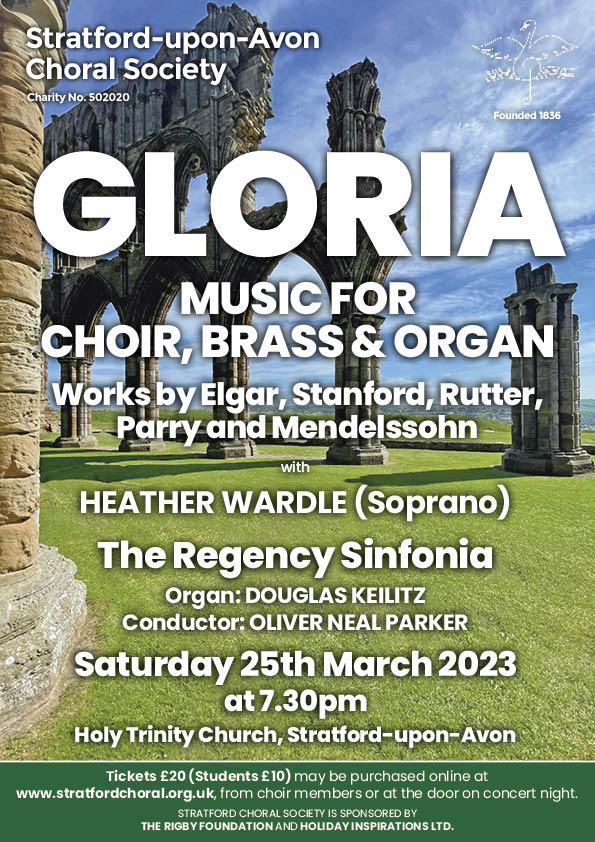 This was accompanied by several shorter choral pieces from the great British choral tradition. We started with Parry’s Blest Pair of Sirens, a grand setting of Milton's poem "At a Solemn Musick". This describes the experience of listening to sacred music, perhaps even a specific performance Milton attended, as producing rapture in the listener. It invites us to imagine Voice and Verse as personified sisters, heavenly born.
This was accompanied by several shorter choral pieces from the great British choral tradition. We started with Parry’s Blest Pair of Sirens, a grand setting of Milton's poem "At a Solemn Musick". This describes the experience of listening to sacred music, perhaps even a specific performance Milton attended, as producing rapture in the listener. It invites us to imagine Voice and Verse as personified sisters, heavenly born.
Our guest soprano for the evening, Heather Wardle, sang A Song of Wisdom by Charles Villiers Stanford. Born in Dublin and educated at Cambridge, Stanford was appointed Organist at Trinity College while still an undergraduate and went on to study in Leipzig and Berlin. He was one of the founding professors of the Royal College of Music. His musical output included operas, symphonic works, and many works for the church. A Song of Wisdom is one of a cycle of Bible songs, with its text taken from Ecclesiastes 24. Here the composer reflects the power and reaffirming nature of the text in dramatic melodies and majestic accompanying textures.
We also sang four other pieces: Elgar's Give unto the Lord (a setting of Psalm 29) and the opening movement of his oratorio The Apostles which is often performed as a separate piece entitled Spirit of the Lord; Mendelssohn’s Hear My Prayer which was first performed in 1845 and is an exquisite cantata - it includes the famous section O for the Wings of a Dove; and as a nod to the coming coronation, we sang Parry's anthem I Was Glad which was performed at Queen Elizabeth's coronation.
Handel's Messiah
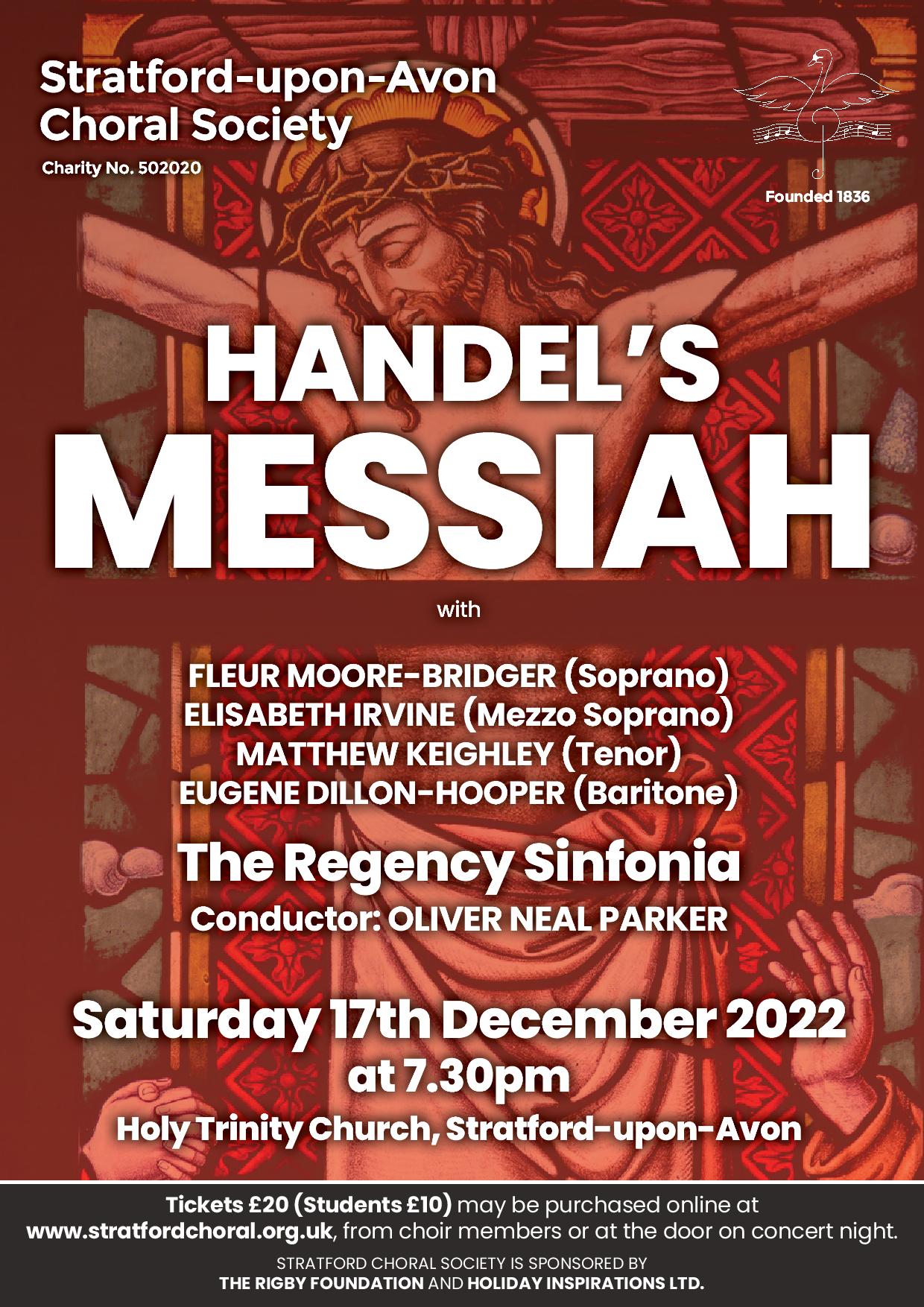 Stratford Choral Society Concert
Stratford Choral Society ConcertHandel’s Messiah
Holy Trinity Church
17.12.22
Review by Alex Austin
Handel’s great masterpiece is the most popular of choral works and rightly so as well demonstrated by this superb performance which clearly revealed it as a work of sheer musical genius. It has marvellous melodic content, vast emotional range, brilliant expressiveness and powerful drama. The choral society have performed the work regularly over the years and that familiarity showed with a firm grasp of the music. They were perfectly accompanied by four outstanding young soloists and the Regency Sinfonia. It was brilliantly conducted by Oliver Neal Parker who moved the work along at exactly the right tempo, carrying the narrative forward with originality and freshness. It was a marvellous story marvellously well told.
From the opening bars of the overture you knew you were in safe hands with the totally assured playing of the Sinfonia which lasted throughout. The tenor Matthew Keighley began the story with a ‘Comfort ye’ which was indeed truly comforting. His unusual warm and mellow tone was employed to great effect in an original and convincing performance. His recitative ‘Thy rebuke hath broken his heart’ was extraordinarily beautiful and moving, as was almost everything he sang. The opening chorus ‘And the glory of the Lord’ was sung with glorious lightness and rhythmical bounce. The magnificent bass, Eugene Dillon-Hooper, boomed in with a scary ‘Thus saith the Lord’, his voice powerfully dramatic for one so young with exceptional volume and declamatory skill. His ‘Why do the nation’s’ was thrilling and the great bass show-piece. The trumpet shall sound was utterly magnificent and the trumpet playing brilliant. You won’t hear the piece done better.
Elizabeth Irvine , the alto was another virtuoso singer adorning her pieces with some spectacular runs and ornamentations all done with supreme confidence. Her intense ‘He was despised’ was heart-rending. The stunning quartet of soloists was completed by soprano Fleur Moore-Bridger, a real star who gave a dazzling performance, using her exquisite silver voice to beautiful effect. Her top noted rang out spectacularly powerful and pitch-perfect no more so than in ‘I know that my redeemer liveth’, particularly at ‘now is Christ risen’ and there were some fine contrasts in her singing. Her voice was well suited to the lovely ‘How beautiful are the feet’ in a really lovely warm and tender rendition. All of the soloists’ set-pieces were all sung superbly and in the whole concert there were really too many choral highlights to single out. I’ll just mention the serenely pure entry of the sopranos in ‘And he shall purify’ and the profoundly moving ‘’the Lord hath laid on Him the iniquity of us all’. Their magnificent and overwhelming Hallelujah chorus was attacked with spine-tingling zeal. The thunderous ovation which this fine five-star performance produced was thoroughly well-deserved and the whole concert was a powerful reminder of the wonder of God becoming human and the fullness of life which Christ’s birth brought, which is at the heart of the real meaning of Christmas and the heart of this wonderful work.
Alex Austin
Haydn and Mendelssohn
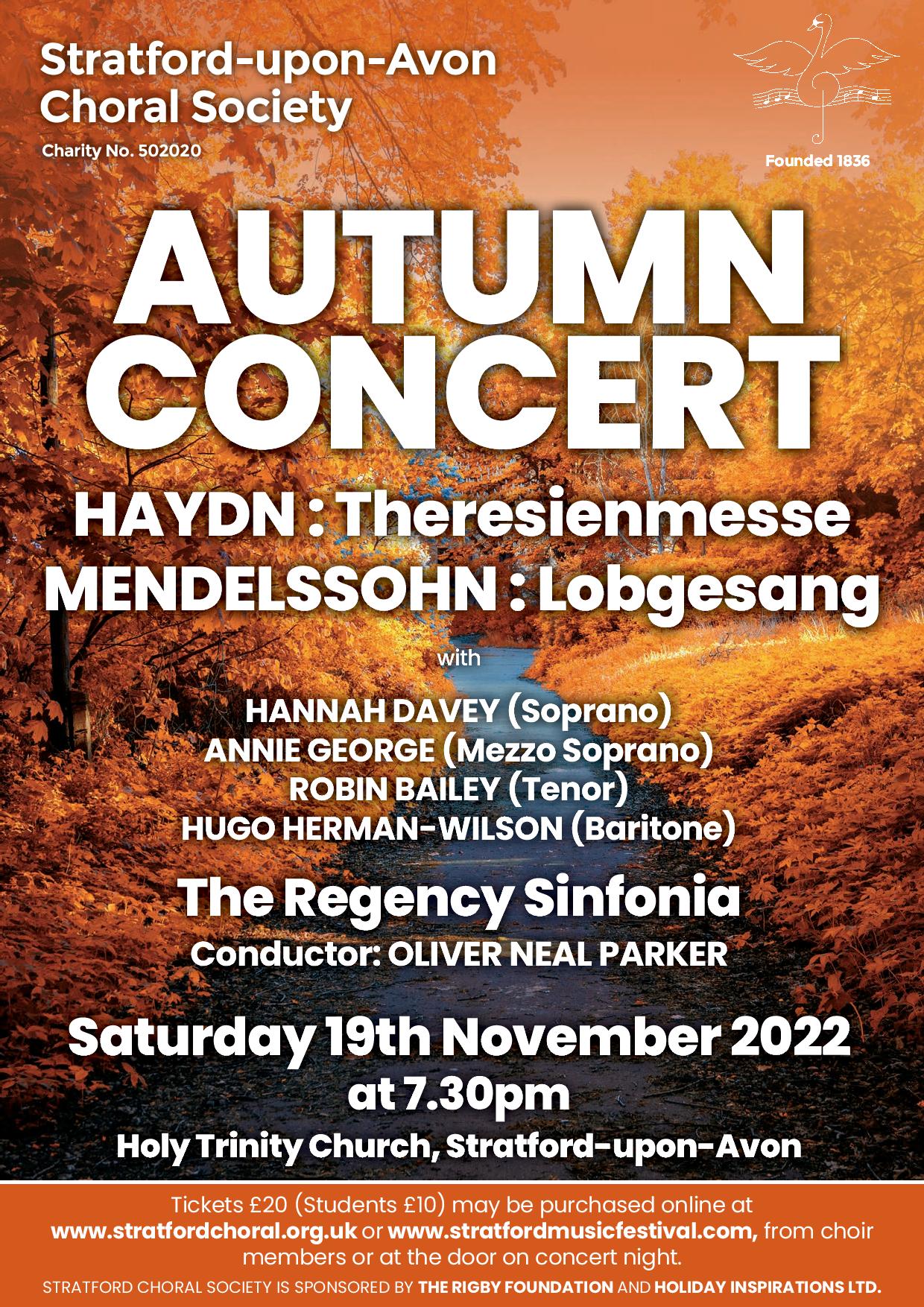
A concert featuring some of Haydn's and Mendelssohn's greatest choral music
Haydn's Theresienmesse is one of his six great masses written for the Prince Esterhartzy. It demonstrates a fusion of exuberance, originality, classical elegance and intellectual power which explains to a large extent the compelling appeal of his music. These are the qualities that placed Haydn far and away above the level of all except Mozart amongst his contemporaries, and which kept him at the forefront of music during most of the eighteenth century.
Mendelssohn described the Lobgesang (or Hymn of Praise) as a ‘symphonic cantata’, possibly to avoid comparisons with Beethoven’s ninth symphony, though the two works have little in common other than the simple fact that they are both choral symphonies. The choral sections are clearly influenced by Bach’s example in the layout of recitatives, arias and choruses, the fugal writing of the opening and closing choruses, and the use of the Lutheran chorale ‘Nun Danket alle Gott’ (Now thank we all our God). The whole symphony is, however, unmistakably Mendelssohn.
Both of the pieces are wonderfully uplifting and should make for a thrilling concert performance.
A Tribute to Vaughan Williams
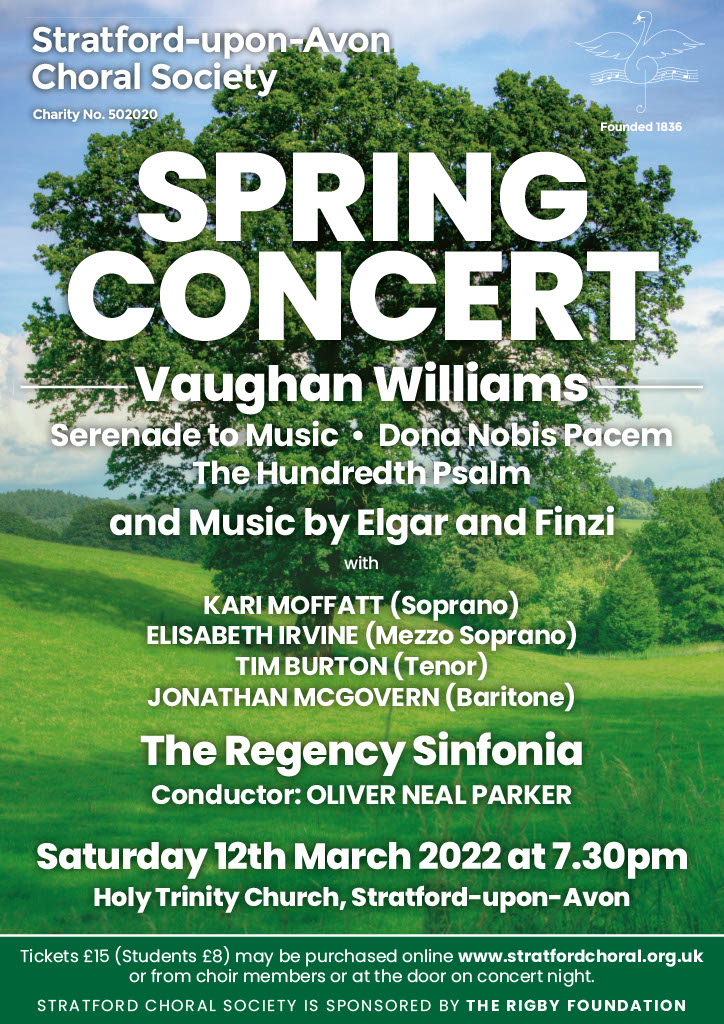 This year we celebrate the 150th anniversary of the birth of Ralph Vaughan Willias, one of England's great composers. Our concert includes three of his best known choral works, along with music from two of his contemporaries - Edward Elgar and Gerald Finzi.
This year we celebrate the 150th anniversary of the birth of Ralph Vaughan Willias, one of England's great composers. Our concert includes three of his best known choral works, along with music from two of his contemporaries - Edward Elgar and Gerald Finzi.
Dona Nobis Pacem is a fiercly anti-war cantata. Vaughan Williams served throughout the First World War, initially as a front-line ambulance driver and later in the artillery. The horrors of war made a lasting impression on him, and he composed little in the years immediately afterwards. In 1936, with war clouds gathering again over Europe, he wrote his passionate plea for peace - Dona Nobis Pacem - "Give us Peace".
The sublime Serenade to Music, written in 1938, is maybe Vaughan Williams' best known choral work. Reminiscent in places of The Lark Ascending, it sets to music Shakepeare's words from The Merchant of Venice. The profound beauty of both the words and the music in this piece have made it a favourite among performers and audiences alike.
Also setting Shakespeare's words to Music, Geral Finzi's Let us Garlands Bring is a setting of five songs to to music for solo Baritone. Finzi was a young protegé of Vaughan Williams and this is maybe his best known vocal composition.
See the concert review in News


